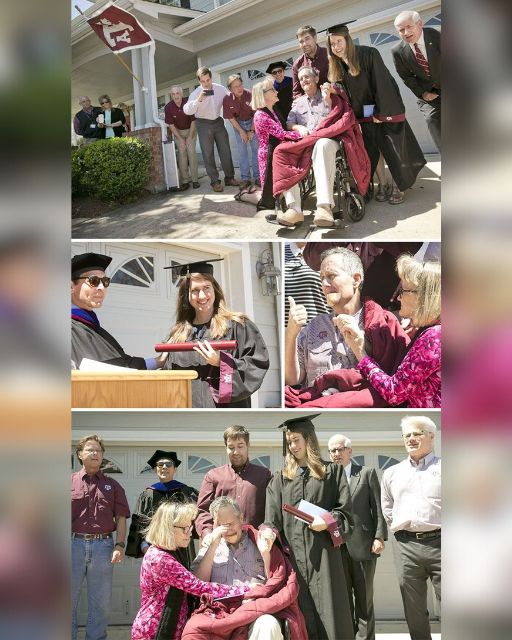We knew he wouldn’t make it to campus.
The long walk from the parking lot to the stadium would have been too much for him. The doctors were blunt—weeks, maybe days. But Dad was determined. And proud. He often mentioned how much he wanted to see me walk across that stage, diploma in hand.
So, I brought the stage to him.
I contacted my dean, unsure if it was too much to ask. “Is there any chance,” I asked, “that we could bring the ceremony here?” After two hours, he replied: “We’re on it.”
Out of nowhere, a small army of maroon appeared on our front lawn that morning, the day I was supposed to graduate. Professors, staff members, and even a few of Dad’s former Aggie classmates. They set up a podium by the garage. My robe was wrinkled. My tassel hung the wrong way.
But none of that mattered.
As I rounded the corner and saw my dad—wrapped in that familiar university blanket, an oxygen tank by his side, his eyes already full of tears—I felt my composure start to crumble.
He held my hand the entire time. When they handed me my diploma and called my name, he gave me a slow, shaky thumbs-up. The kind that says everything when words aren’t enough.
In that moment, with the applause ringing in the air, he leaned in and whispered something so softly that only I could hear.
“Now, open the back pocket.”
At first, I was confused. Which back pocket? Then I realized he meant the pocket on my gown. I reached around awkwardly, expecting to find nothing, but my fingers brushed against something paper. Carefully, I pulled it out—a folded letter, yellowed with age, creased as if it had been read many times before.
“What’s this?” I asked, my voice trembling.
“I’ll read it later,” he whispered, his breaths shallow. “When you’re ready.”
After the ceremony, our guests stayed for cake and lemonade under the big oak tree. Mom buzzed around, making sure everyone had enough to eat, her hands shaking as she filled the glasses. She kept glancing over at Dad, propped up in his wheelchair, smiling faintly despite how exhausted he looked.
I slipped the letter into my jeans pocket, not yet ready to face it. I drifted through the crowd, accepting hugs and congratulations, feeling both thankful and heavy-hearted. People told me how special this moment was, how full of love the day had been. It was a unique experience, but bittersweet, knowing this could be one of our last big family moments.
As the sun set and the shadows stretched across the driveway, Dad signaled for me to come over. He seemed smaller than ever, fragile, but his eyes still held that spark of determination I’d always admired.
“You did well today,” he said softly. “I’m proud of you.”
“I couldn’t have done it without you,” I replied, fighting back tears. “You’ve been my greatest teacher.”
A small smile tugged at his lips. “Not everything,” he said. “That letter… it has things I never got the chance to say.”
Before I could ask more, he closed his eyes and tilted his head back. I thought he had fallen asleep, so I quietly stepped away, letting him rest.
That night, after the last chairs were stacked and the leftovers put away, I found myself alone in my room, staring at the envelope. The house was silent except for the hum of the fridge below. My heart pounded as I slowly unfolded the letter and laid it out on my desk.
The handwriting was unmistakably Dad’s—messy but deliberate, each word slightly slanted as if he were in a hurry but still trying to make it legible.
Dear Riley,
If you’re reading this, it probably means I’m no longer here. But maybe I am, and I just find it hard to say these things in person. There’s something important I need to share with you.
First, I want to apologize. I’m sorry for the times I didn’t have the patience, for the arguments over small things, and for not being the father I always wanted to be. Life’s been hectic, and sometimes I’ve made mistakes. But I want you to know that I always did my best, every single day.
